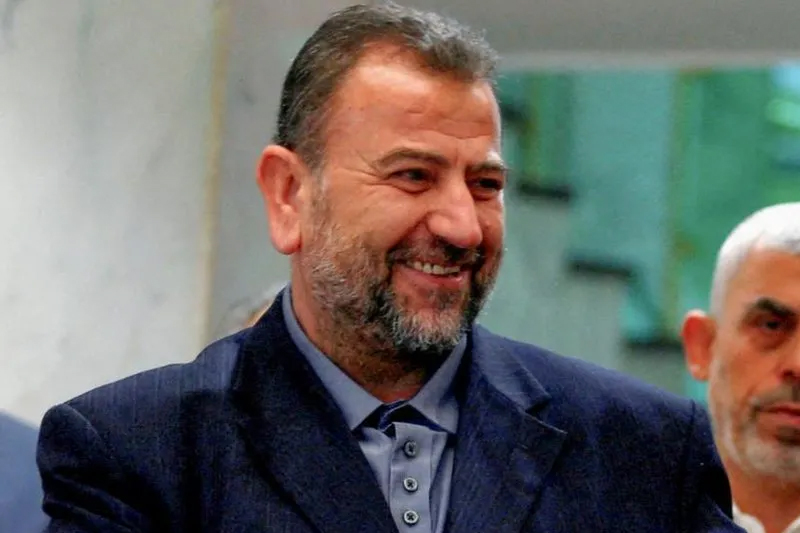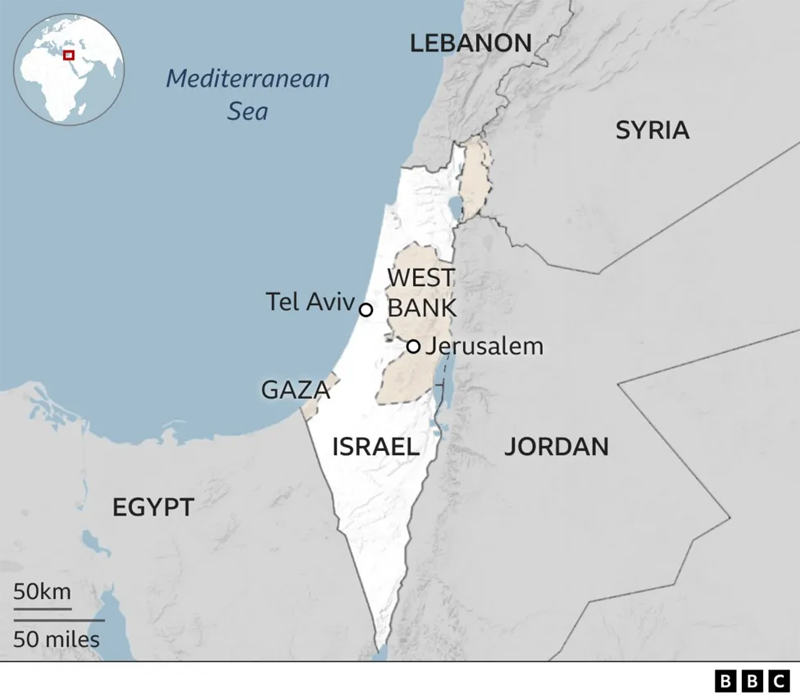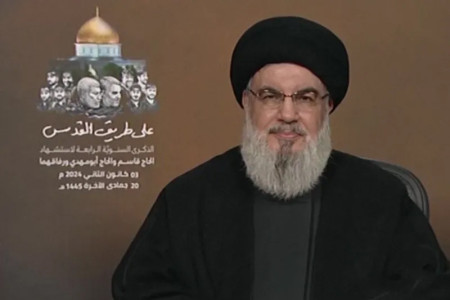Saleh al-Arouri died in a drone attack in Beirut on Tuesday. Israel has not confirmed it was responsible.
Mr Nasrallah described Arouri's death as a "major, dangerous crime about which we cannot be silent".
He added that if Israel wages war on Lebanon "there will be no ceilings, no rules" to Hezbollah's response.
"We are not afraid of war," said Mr Nasrallah in a televised address.
"Those who think of going to war with us will regret it. War with us will come at a very high cost."
He previously said that any killings in Lebanon would be a red line.
Hezbollah - like its ally, Hamas - is considered a terrorist organisation by Israel, the UK and others. It is the largest political and military force in Lebanon and has ministers in the country's government.
The attack that killed Arouri was the first in Beirut following months of exchanges of fire between Iranian-backed Hezbollah and Israel, in response to the war in Gaza. These had largely been confined to Lebanon's southern border.
The Israeli Defense Forces (IDF) said on Wednesday it was "defending its borders" from a number of missiles launched from Lebanon.
That was after its military was reported to have increased the number of its air defence batteries near the border.

Arouri was a key figure in the Izzedine al-Qassam Brigades, Hamas's armed wing, and a close ally of Ismail Haniyeh, the Hamas leader. He had been in Lebanon acting as a connection between his group and Hezbollah.
He was known to be on Israel's hit list and the country's prime minister, Benjamin Netanyahu had previously vowed to eliminate Hamas's leaders - wherever they are.
Arouri was on a US blacklist too, with a bounty of $5m ($3.9m) on his head since 2018.
Miri Eisin, a retired colonel from the Israel Defense Forces (IDF) told the BBC that the Hamas deputy was "living in the heart of the Dahiya, in the heart of the Hezbollah area of Beirut" and that he was the "direct connection between Hamas and Hezbollah".
She added that while she felt bad for the Lebanese people about the risk of a full-blown conflict with Israel, it was important to deal with "terror operatives".
The US said it remained incredibly concerned about the risk of the conflict in Gaza spreading to the wider region after Arouri's death - a fear shared by Lebanese Foreign Minister, who said his government had appealed to Hezbollah not to retaliate.
"We are very concerned, [the] Lebanese don't want to be dragged, even Hezbollah does not want to be dragged into a regional war," Abdallah Bou Habib told the BBC.
US State Department spokesman Matthew Miller said on Wednesday that Washington was not given advance notice of the strike in Beirut that killed Arouri.
The United Nations (UN) peacekeeping force in Lebanon says it is also deeply worried about a potential escalation of violence.
A spokesperson for the UN's Interim Force in Lebanon (Unifil) has urged all parties to show restraint, saying that a wider conflict would have devastating consequences for both Israel and Lebanon.
Iran has condemned the killing of Arouri, with the country's foreign minister criticising Israel for its "cowardly terrorist operations" in a post on X, formerly Twitter.
Hamas has reportedly told Egyptian and Qatari mediators that it is suspending talks over the possible release of more Israeli hostages in response to Arouri's killing.
There are also reports in Arab media that a scheduled visit by an Israeli delegation to the Egyptian capital has been postponed.

Meanwhile, the fighting in Gaza continues. The UN said five people were killed in an attack on the Palestinian Red Crescent building in the southern city of Khan Younis on Tuesday, as Israel urged people to evacuate.
A five-day old baby was among the dead, according to a spokeswoman for the United Nations Office for the Coordination of Humanitarian Affairs (OCHA).
"This was a space where babies were living. This is a space where children were living," said Gemma Connell.
"You can see on the floor the blood. The world should be absolutely horrified. The world should be absolutely outraged."
Leaflets have been dropped in Khan Younis, warning residents to leave specified areas designated a "combat zone" by the IDF.
The message said it was an "urgent warning" to evacuate several blocks in numerous neighbourhoods.
The Hamas-run health ministry in Gaza says more than 22,000 people have been killed in the territory since Israel started its retaliatory campaign.
At least 1,200 people were killed when Hamas attacked Israel on 7 October and about 240 others were taken hostage.
Some 105 hostages were later released during a six-day ceasefire at the end of November.
By Kathryn Armstrong
BBC News


